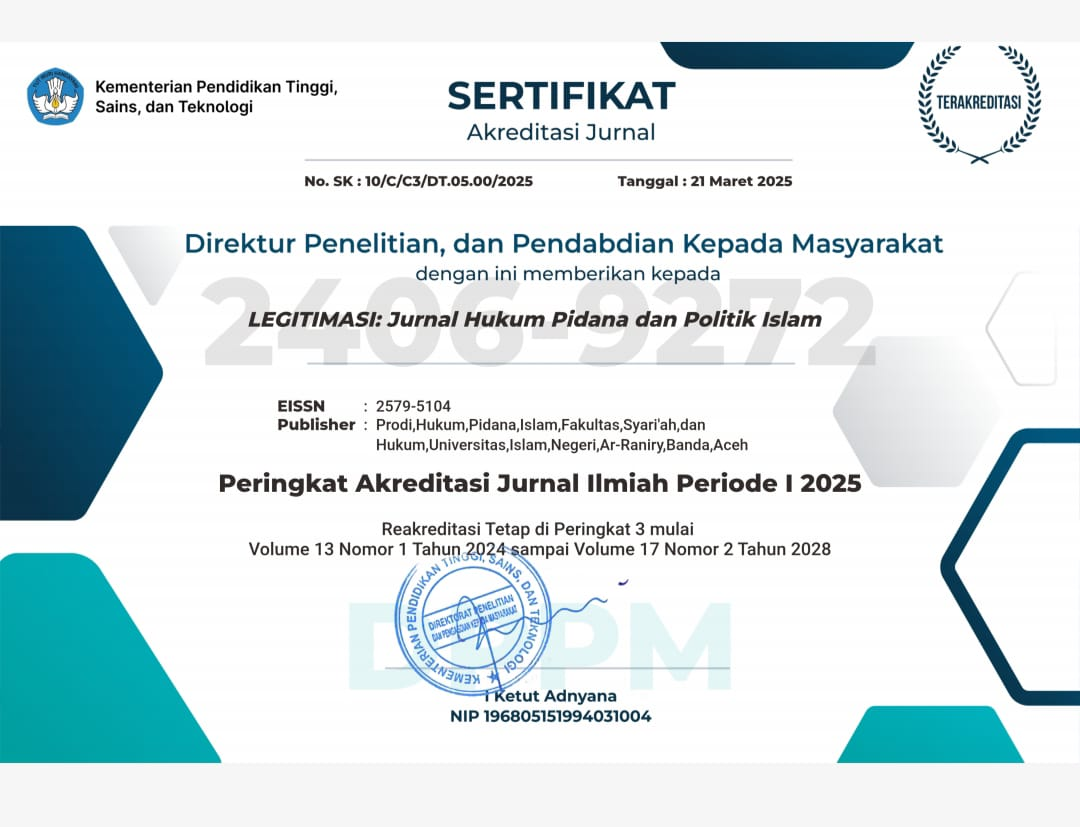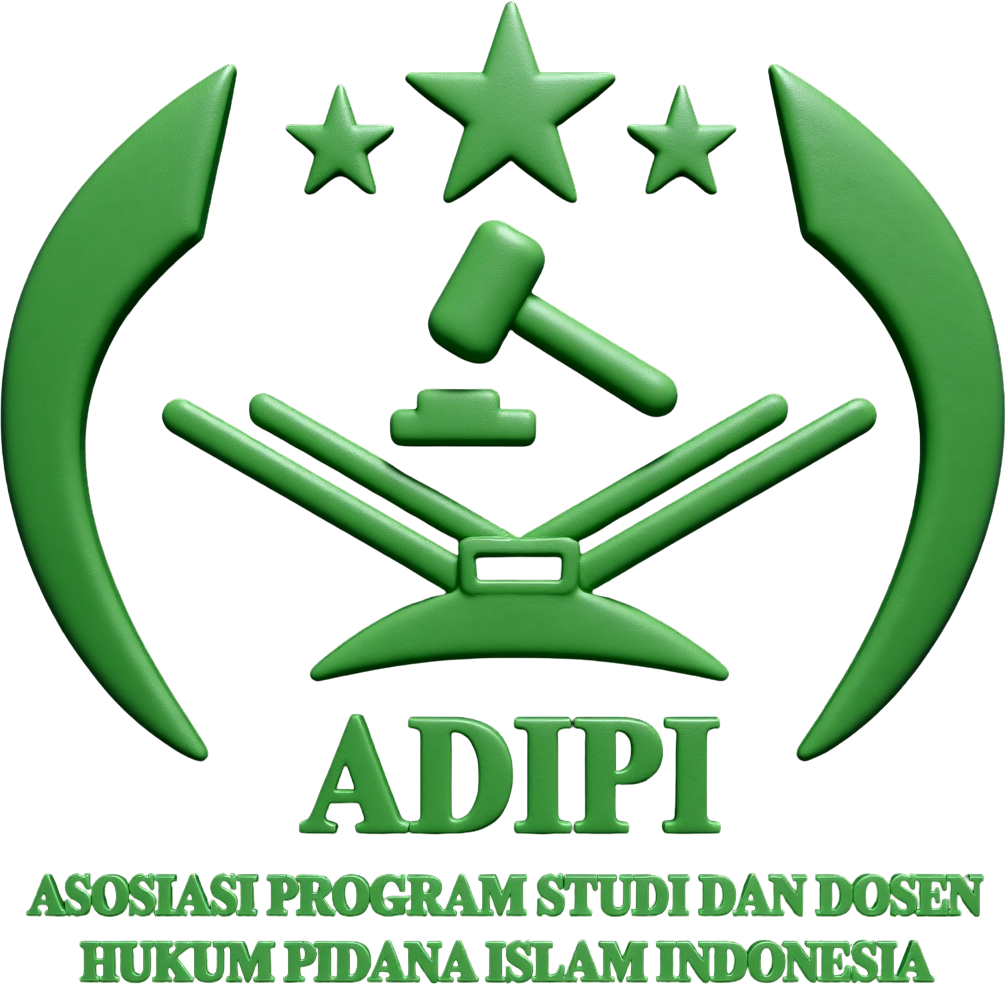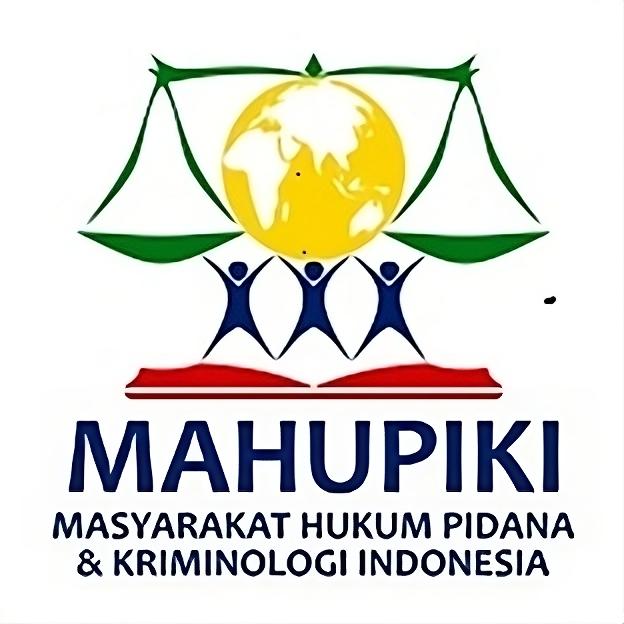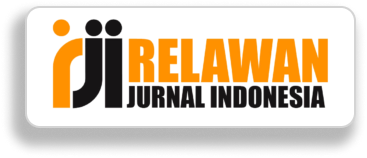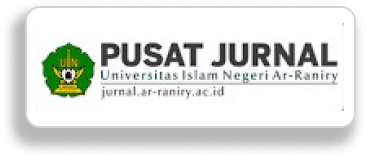Amnesti: Hak Prerogatif Presiden dalam Perspektif Fiqh Siyasah
DOI:
https://doi.org/10.22373/legitimasi.v11i2.15218Keywords:
Amnesty, Presidential Authority, Fiqh SiyasahAbstract
This article examines the granting of amnesty to perpetrators of political crimes by the President of the Republic of Indonesia. This authority is regulated in the Basic Law of the Republic of Indonesia, 1945, Article 14 paragraph (2), and Emergency Law Number 11, 1954, Article 1 on Amnesty and Abolition. Both of these rules do not specifically describe the limitations or types of criminal acts that amnesty may be granted to. The amnesty granted by the President to Baiq Nuril, a victim of sexual harassment involved in cases of infringement of the Information and Electronic Transactions Act, was carried out on the basis of humanity and justice. This policy has influenced the historical changes in amnesty law aimed at non-political cases. The study aims to examine the authority of the President of Indonesia in granting amnesty, reviewed from a fiqh siyasah perspective. Data is obtained through library studies and analyzed using a normative or doctrinal approach. The results of the study show that the granting of amnesty by the president is a prerogative of the president, as stipulated in the Basic Law of the Republic of Indonesia 1945. But in fiqh siyasah, the essence of amnesty is forgiveness. Forgiveness is the prerogative of the head of state, aimed at creating greater crimes, and does not violate the provisions of the law that have been established. The President's policy of granting amnesty in non-political cases is in accordance with the provisions of the fiqh siyasah, because the concept of amnesty in the law and the notion of forgiveness in the fiqh siyasah are equally based on the interests of the state and the crime of the community. Historical facts show that the Prophet Muhammad and the caliphs after him gave forgiveness to rebels, war criminals, and non-political criminals.
References
‘Awdah, ‘Abd al-Qadīr. Al-Tasyrī‘ Al-Jinā’Iy Al-Islāmiy: Muqāranah Bi Al-Qānūn Al-Waḍ‘Iy. I. Bayrūt: Muassasah al-Risālah, 1997.
Abdul Wahhab Khallaf. Politik Hukum Islam. Yogyakarta: Tiara Wacana, 1994.
Abdullah, Taufik. Ensiklopedi Tematis Dunia Islam. Jakarta: Ichtiar Baru Van Hoeve, 2002.
Aji, M. Prakoso, and Jerry Indrawan. “Memahami Studi Perdamaian Sebagai Bagian Dari Ilmu Hubungan Internasional.” Jurnal Pertahanan & Bela Negara 9, no. 3 (2019). https://doi.org/10.33172/jpbh.v9i3.637.
Akh.Minhaji. Sejarah Sosial Dalam Studi Islam Teori, Metodologi, Dan Implementasi. Yogyakarta: Suka Press, 2013.
Al-Maududi, Abu Al A`la. Islamic Law and Constitution. Islamic Publication, 1977.
Al-Mawardi, Imam. Al-Ahkam Al-Sulthaniyyah. Kairo: Dar Al-Fikr, 1960.
Djazuli, A. Kaidah-Kaidah Fikih. Jakarta: Kencana, 2006.
Hendratno, Edie T. Negara Kesatan, Desentralisasi Dan Federalisme,. Yogyakarta: Graha Ilmu, 2009.
Herwati, Siti Rakhma Mary. Pemberian Amnesti, Abolisi Dan Rehabilitasi Untuk Para Pejuang Agraria Demi Keadilan. Bogor: Sajogyo Institude, 2015.
Imam Fauzi, Suyogi. “Politik Hukum Pemberian Grasi, Amnesti Dan Abolisi Sebagai Konsekuensi Logis Hak Prerogatif.” Ukum & Pembangunan 51, no. 3 (2020).
Kamali, Mohammad Hashim. “Exploring Facets of Islam on Security and Peace: Amnesty and Pardon in Islamic Law.” ICR Journal 3, no. 3 (2012). https://doi.org/10.52282/icr.v3i3.536.
Kartika, Shanti Dwi. “Amnesti Bagi Baiq Nuril Maknun, Layakkah Diberikan?” Info Singkat 11, no. 14 (2019).
Kemendikbud. “KBBI - Kamus Besar Bahasa Indonesia.” Kamus Besar Bahasa Indonesia, 2019.
Laplante, Lisa J. “Outlawing Amnesty: The Return of Criminal Justice in Transitional Justice Schemes.” Virginia Journal of International Law 50, no. 1 (2009).
Moleong, Lexy J. Metodologi Penelitian Kualitatif. 7th ed. Bandung: Remaja Rosda Karya, 1996.
Muhammad, Rusjdi Ali. “Reconciliation for the Settlement of Criminal Cases: Reactualization of Local Wisdom in Indonesian Criminal Law [Upaya Perdamaian Untuk Penyelesaian Perkara Pidana: Reaktualisasi Kearifan Lokal Dalam Hukum Pidana Indonesia].” LEGITIMASI: Jurnal Hukum Pidana Dan Politik Hukum 10, no. 2 (November19,2021):171.https://doi.org/http://dx.doi.org/10.22373/legitimasi.v10i2.11339.
Muhammad, Rusjdi Ali, and Dedy Sumardi. Konflik Dan Kekerasan: Solusi Syariat Islam. Banda Aceh: Dinas Syariat Islam Aceh, 2014.
Nazir, Moh. Metode Penelitian. Bogor: Ghalia Indonesia, 2013.
Ramdlany, Ahmad Agus. “Restorative Justice in Islamic Legal Philosophy Perspective.” International Journal of Business, Economics and Law 24, no. 2 (2021).
Soekanto, Soerjono. Pengantar Penelitian Hukum. Jakarta: Universitas Indonesia Press, 2008.
Sujatmiko, Sujatmiko, and Willy Wibowo. “Urgensi Pembentukan Regulasi Grasi, Amnesti, Abolisi Dan Rehabilitasi.” Jurnal Penelitian Hukum De Jure 21, no. 1 (2021). https://doi.org/10.30641/dejure.2021.v21.91-108.
Sumardi, Dedy. “Hudûd Dan HAM: Artikulasi Penggolongan Hudûd Abdullahi Ahmed An-Na’im.” MIQOT: Jurnal Ilmu-Ilmu Keislaman 35, no. 2 (2011): 372–90. https://doi.org/http://dx.doi.org/10.30821/miqot.v35i2.149.
Website:
Abi Jam’an Kurnia, Tahapan Pengajuan Amnesti, 27 Mei 2019. Diakses melalui situs: https://m.hukumonline.com/klinik/detail/ulasan/It5ce8049120a7f/tahapan-pengajuan- amnesti/
Ahmad Rifai, Implikasi Kaidah Fiqih “Tasharruf al imam’ala al ra’iyyah manuthun bi al mashlahah” Terhadap Peran Negara dalam Pengelolaan Zakat di Indonesia.2017. https://jurnal.staialhidayahbogor.ac.id/index.php/am/article/download/147/145
Indonesiabaik.id, Sejarah Pemberian Amnesti Presiden Indonesia, 2019. Diakses melalui situs:http://indonesiabaik.id/motion_grafis/sejarahpemberian-amnestipresiden-indonesia
Maidah Purwanti. Kewajiban dan Tanggung Jawab Negara dalam Pemenuhan Hak Asasi Manusia,28Juli2016. Diakses melalui situs: https://lsc.bphn.go.id/artikel?id=3651 www.dpr.go.id,
Rancangan Laporan Singkat Dari Rapat Kerja Komisi III DPR RI Dengan Mentri Koordinator Bidang Politik, Hukum Dan Keamanan (Menkopolhukkam), 21 Juli 2016. Diakses melalui situs:https:/.pdf.
Normand Edwin Elnizar. Pakar Hukum Jelaskan Soal 4 Ukuran Amnesti, Baiq Nuril Punya Peluang,15Juli2019.Diaksesmelaluisitus:https://www.hukumonline.com/berita/baca/pakar-hukum-jelaskan-ukuranamnesti-baiqnuril.
Undang-Undang Darurat Nomor 11 Tahun 1954 Pasal 1 Tentang Tentang Amnesti dan Abolisi www.dpr.go.id, Rancangan Laporan Singkat dari Rapat Kerja Komisi III DPR RI dengan mentri koordinator bidang politik, hukum dan keamanan (menkopolhukkam), 21 Juli 2016. Diakses melalui situs: https://www.dpr.go.id/dokakd/dokumen/K3-14-44596bf617c08d037da1c5178358e1df.pdf
Purnomo, Ini Grasi dan Amnesti yang Diberikan Presiden RI, 30 Januari 2017. Diakses melalui situs: https://www.obsessionnews.com/ini-grasi-dan-amnesti-yang-diberikan-Presiden- ri/
Shanti Dwi Kartika. “Amnesti Bagi Baiq Nuril Maknun, Layakkah Diberikan?”, info singkat: Bidang Hukum, Vol. XI, No.14/II/Puslit/Juli/2019. Diakses melalui situs: http://puslit.dpr.go.id
Downloads
Published
Issue
Section
License
Authors who publish in Legitimasi: Jurnal Hukum Pidana dan Politik Hukum agree to the following terms:
- Authors retain copyright and grant the journal right of first publication with the work simultaneously licensed Attribution-ShareAlike 4.0 International (CC BY-SA 4.0) that allows others to share the work with an acknowledgment of the work's authorship and initial publication in this journal.
- Authors are able to enter into separate, additional contractual arrangements for the non-exclusive distribution of the journal's published version of the work (e.g., post it to an institutional repository or publish it in a book), with an acknowledgment of its initial publication in this journal.
- Authors are permitted and encouraged to post their work online (e.g., in institutional repositories or on their website) prior to and during the submission process, as it can lead to productive exchanges, as well as earlier and greater citation of published work. (See The Effect of Open Acces)

